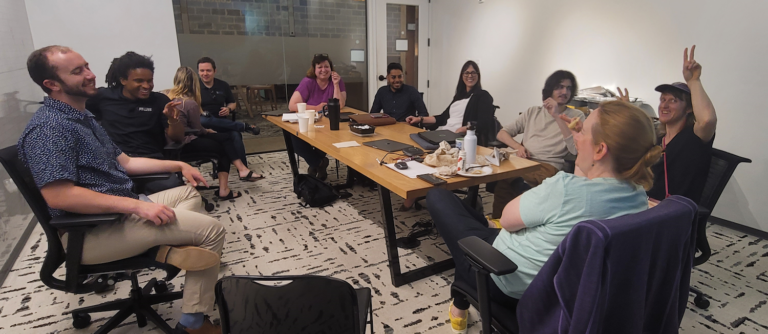
Amy Sharma, PhD is the executive director of Science for Georgia, an organization whose mission is to advocate for the responsible use of science in public policy, improve communication between scientists and the public, and increase public engagement with science. She chatted with ESAL about the value of factual scientific support to state legislators and interpersonal relationships between scientists and other community members.
EL: What has been your educational and career path so far, leading your current role?
Sharma: I earned an undergraduate degree in biomedical and electrical engineering from Duke University, and then worked for two years designing chips at IBM. I returned to Duke for a PhD in biomedical engineering, studying nuclear imaging. I completed an American Association for the Advancement of Science Science and Technology Policy Fellowship at the National Science Foundation, then worked as a researcher at Georgia Tech Research Institute in radar and big data. Following that, for a year, I was an assistant professor in medical physics at the University of Western Australia. I returned to Georgia Tech and then was at various startups in data analytics and product development.
I have now been working for Science for Georgia for over four years and I have to be honest, Atlanta is pretty awesome!
EL: What are the issues that Science for Georgia prioritizes, and how does it achieve its mission?
Sharma: Science for Georgia has a three-fold mission: improving communication between scientists and the public, which is where our SciComm Academy comes in; public outreach, which we accomplish with activities like the Atlanta Science Tavern and Science Comedy and other events; and advocating for the responsible use of science in public policy, which is accomplished through white papers, our legislative scorecard, and partnerships.
Two of our priorities are expanding Medicaid access and combating climate change. The best thing that could be done for the workforce in Georgia is giving people access to health insurance, since this has been shown to be one of the best ways to improve their lives and be a productive member of society.
For climate change, we figure out ways to economically incentivize the changes that we’d like to see people making, like investing in green infrastructure, accounting for the true cost of carbon, and cutting down carbon emissions. Georgia is not a particularly environmentally friendly state, but there are so many talented grassroots organizations that have experience with advocacy and engaging with politicians, and we support those groups by providing scientific expertise.
Fortunately, there’s a lot of momentum right now in Georgia for attracting green businesses. I hope we can invest in new manufacturing capabilities in a way that sets a great example. It would be a big success to be able to say, “a bunch of electric vehicle factories set up in Georgia, and they were all green and sustainable.”
EL: What are the challenges you face?
Sharma: Working in policy is inherently slow and cumbersome, and sometimes we feel stuck. It can be uncomfortable because, as scientists, we are used to having solutions. People say, “may all your problems be technical.” Well, none of our problems are technical, so that’s a new realm for much of our team. None of us had any specialized training besides being scientists, so we’re just making our way forward together. It is wonderful to have a like-minded community.
EL: What are some of the lessons you’ve learned about interacting with non-scientists and policy makers, especially working in a sometimes politically tense environment?
Sharma: When you ask a lot of people to name a living scientist, they can’t do it. I want the answer to that question to be, “I met this person at the coffee shop the other day, and she’s a scientist.”
In a lot of people’s minds, scientists are trapped in an ivory tower. When we point out that we are your neighbors with whom you have a personal connection, that goes a long way toward building the trust of the public in science and having a profound impact. One of the common reactions that we get from partners when we start on a project is, “This is not what we were expecting” and even sometimes, “We thought you would be old dudes in glasses.”
It is important to stick to the facts when we take on the role of people providing scientific feedback, and it sometimes takes a bit of time to figure out how to stay objective and be solutions-oriented, not politicized. We work at the state assembly level, so the politicians here actually need to get something done - they need to pass a budget and provide services to people, and they work for us! They value people who are honest brokers of factual information, and they want to be contacted and engaged in discussion.
And, if you care about something, have an elevator pitch about it ready and in the back of your mind for when someone asks you what you care about!
A last important lesson is to meet your audience where they are. We are in an agriculture-heavy state. People will say that climate change isn’t real but will also tell you how the weather is changing and they can’t grow crops the way they used to. Just use another phrase beside “climate change” if it is preventing progress from being made together. We have resources on advocating for science on our website!
Are you involved with an organization or effort that you think might be of interest to the ESAL community? Or have heard about an organization or initiative that you’d like to learn more about? Let us know here, and we may feature it in a future post.